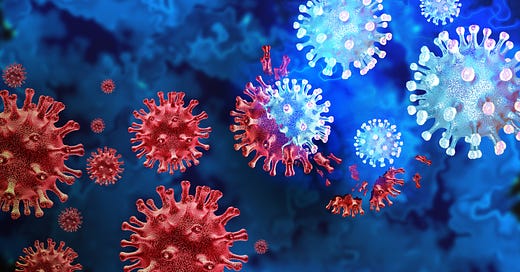A Quick Look at BHT
(A seemingly magic bullet for lipid-coated viruses with anti-aging properties)
BHT (Butylated Hydroxytoluene), a synthetically mass-produced FDA-approved food preservative, also occurs in nature. It is produced organically in small amounts by certain plant species as an antioxidant.1 The following information is based on the consumption of synthetically made BHT.
BHT is effective against the following diseases: herpes, herpes encephalitis, shingles, influenza, raging intestinal CMV, and hepatitis, all caused by lipid-coated viruses.2 This suggests that BHT is effective against lipid-coated viruses, which make up a significant portion of all known viruses (the most recent notable virus scares, monkeypox and COVID-19, are caused by lipid-coated viruses). Test tube experiments have lead to the proposal that BHT is capable of stripping the lipid envelope from lipid-coated viruses, making them easily detectable by the immune system (The lipid envelope serves as a type of camouflage.) Lipid-coated viruses are the most difficult for the immune system to eliminate.
After infection, lipid-coated viruses can go into an inactive state where they are not destroyed by the immune system. They can then periodically reactivate themselves, each time causing symptoms to flare up. For example, according to the National Institutes of Health, about 90 percent of adults are exposed to the herpes virus by age 50. Once infected, they retain herpes simplex virus for the rest of their lives and may experience periodic outbreaks of symptoms.3 BHT supplementation should lessen or completely eliminate these symptoms while also bolstering the immune system’s ability to deal with lipid-coated viruses when first encountered.
In addition to its proven antiviral benefits, BHT improves cardiovascular and brain health by protecting cell membranes and other fat-soluble molecules the body needs. For example, BHT reduces the oxidation of LDL cholesterol and so decreases the chances of developing heart disease.4 It also protects the fat-soluble vitamins A and E from oxidation, allowing them to remain effective. These are only a few of the additional health benefits BHT can provide.
BHT is safe. The therapeutic dose of BHT is 250-1,000 mg. Some people take up to 2,000 mg daily without side effects although others develop liver enzyme elevations in doses between 1000 mg and 2000 mg. These liver enzyme elevations seem to be harmless, if not actually beneficial as higher numbers of these enzymes can help the liver process toxins for excretion from the body. A few people have taken as much as 3,000-7,000 mg, but side effects become quite common at those dosages.5
The public hasn’t heard of BHT for several reasons. First, faulty studies claim BHT is a carcinogen. These studies either cannot be replicated, have been disproved by other studies, or used cartoonishly large doses of BHT — most things are toxic when consumed in excess. In fact, research shows that BHT supplementation reduces the risk of developing cancer.6 Nevertheless, BHT’s reputation was tainted which prevented it from being in the spotlight. Now numerous studies highlighting its benefits are giving BHT the attention it deserves. Second, few studies have been conducted on BHT compared to new and patentable drugs. BHT is not patentable. Pharmaceutical companies do not spend money researching unpatentable drugs because there is no money to be made selling them, no matter how effective they may be. Additionally, medical education programs, financially underwritten by pharmaceutical companies,7 do not teach medical students about alternative medicines like BHT. Medical school curriculum will not cover cheap alternative treatments that would diminish pharmaceutical companies’ profits if they were to go mainstream. As a result, BHT and its benefits are less known than they should be.
Disclaimer: The entire contents of this website are based upon the opinions of LifeLink, unless otherwise noted. Individual articles are based upon the opinions of the respective author.
The information on this website is not intended to replace a one-on-one relationship with a qualified health care professional and is not intended as medical advice. It is intended as a sharing of knowledge and information from the research and experience of LifeLink. LifeLink encourages you to make your own health care decisions based upon your research and in partnership with a qualified health care professional.
If you are pregnant, nursing, taking medication, or have a medical condition, consult your health care professional before using products based on this content.
https://pubmed.ncbi.nlm.nih.gov/27039859
https://projectwellbeing.com/wp-content/uploads/2020/03/BHTbook-StevenWmFowkes-200302.pdf
https://www.hopkinsmedicine.org/health/conditions-and-diseases/herpes-hsv1-and-hsv2/oral-herpes
https://www.earthclinic.com/remedies/BHT.html
https://projectwellbeing.com/wp-content/uploads/2020/03/BHTbook-StevenWmFowkes-200302.pdf
https://pubmed.ncbi.nlm.nih.gov/3053283
https://globalnews.ca/news/5738386/canadian-medical-school-funding




